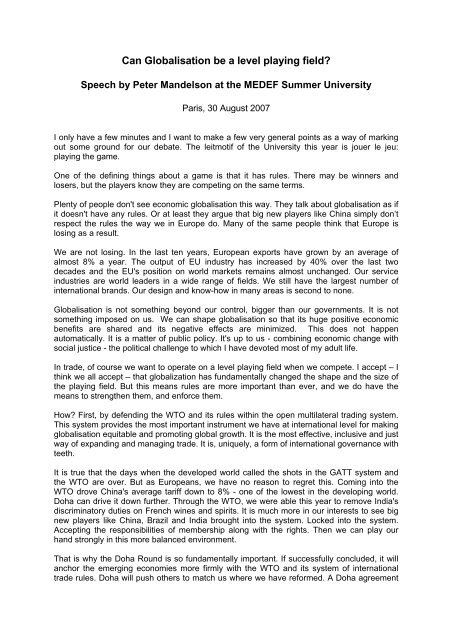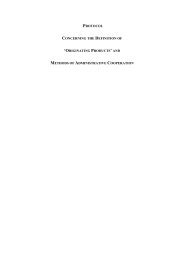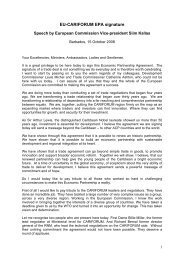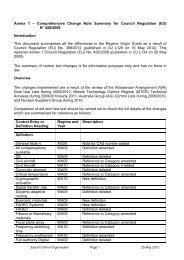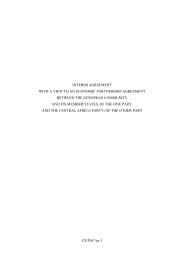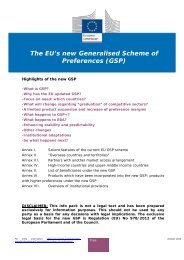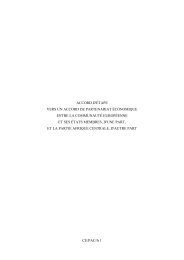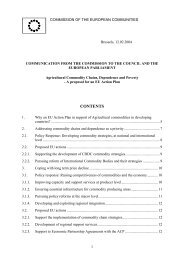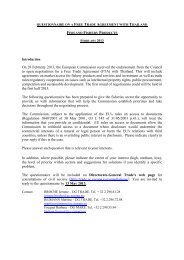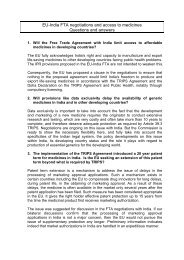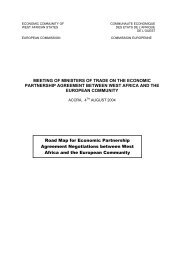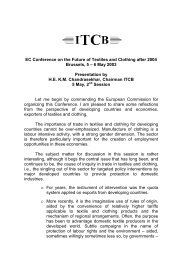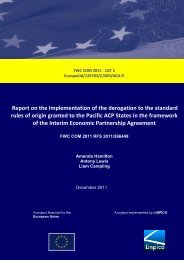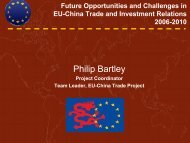Can Globalisation be a level playing field?
Can Globalisation be a level playing field?
Can Globalisation be a level playing field?
You also want an ePaper? Increase the reach of your titles
YUMPU automatically turns print PDFs into web optimized ePapers that Google loves.
<strong>Can</strong> <strong>Globalisation</strong> <strong>be</strong> a <strong>level</strong> <strong>playing</strong> <strong>field</strong><br />
Speech by Peter Mandelson at the MEDEF Summer University<br />
Paris, 30 August 2007<br />
I only have a few minutes and I want to make a few very general points as a way of marking<br />
out some ground for our debate. The leitmotif of the University this year is jouer le jeu:<br />
<strong>playing</strong> the game.<br />
One of the defining things about a game is that it has rules. There may <strong>be</strong> winners and<br />
losers, but the players know they are competing on the same terms.<br />
Plenty of people don't see economic globalisation this way. They talk about globalisation as if<br />
it doesn't have any rules. Or at least they argue that big new players like China simply don’t<br />
respect the rules the way we in Europe do. Many of the same people think that Europe is<br />
losing as a result.<br />
We are not losing. In the last ten years, European exports have grown by an average of<br />
almost 8% a year. The output of EU industry has increased by 40% over the last two<br />
decades and the EU's position on world markets remains almost unchanged. Our service<br />
industries are world leaders in a wide range of <strong>field</strong>s. We still have the largest num<strong>be</strong>r of<br />
international brands. Our design and know-how in many areas is second to none.<br />
<strong>Globalisation</strong> is not something <strong>be</strong>yond our control, bigger than our governments. It is not<br />
something imposed on us. We can shape globalisation so that its huge positive economic<br />
<strong>be</strong>nefits are shared and its negative effects are minimized. This does not happen<br />
automatically. It is a matter of public policy. It's up to us - combining economic change with<br />
social justice - the political challenge to which I have devoted most of my adult life.<br />
In trade, of course we want to operate on a <strong>level</strong> <strong>playing</strong> <strong>field</strong> when we compete. I accept – I<br />
think we all accept – that globalization has fundamentally changed the shape and the size of<br />
the <strong>playing</strong> <strong>field</strong>. But this means rules are more important than ever, and we do have the<br />
means to strengthen them, and enforce them.<br />
How First, by defending the WTO and its rules within the open multilateral trading system.<br />
This system provides the most important instrument we have at international <strong>level</strong> for making<br />
globalisation equitable and promoting global growth. It is the most effective, inclusive and just<br />
way of expanding and managing trade. It is, uniquely, a form of international governance with<br />
teeth.<br />
It is true that the days when the developed world called the shots in the GATT system and<br />
the WTO are over. But as Europeans, we have no reason to regret this. Coming into the<br />
WTO drove China's average tariff down to 8% - one of the lowest in the developing world.<br />
Doha can drive it down further. Through the WTO, we were able this year to remove India's<br />
discriminatory duties on French wines and spirits. It is much more in our interests to see big<br />
new players like China, Brazil and India brought into the system. Locked into the system.<br />
Accepting the responsibilities of mem<strong>be</strong>rship along with the rights. Then we can play our<br />
hand strongly in this more balanced environment.<br />
That is why the Doha Round is so fundamentally important. If successfully concluded, it will<br />
anchor the emerging economies more firmly with the WTO and its system of international<br />
trade rules. Doha will push others to match us where we have reformed. A Doha agreement
will open the markets of the emerging economies further and lock in the access we already<br />
have to global markets. This is the <strong>be</strong>st insurance policy against a global resurgence of<br />
protectionism or trade politicking – not just in the US, but in growing middle income<br />
economies too. In doing so it would emphatically say that the emerging economies are<br />
<strong>playing</strong> in the same system, by the same rule book. A failed Doha Round will badly damage<br />
confidence and weaken the emerging economies attachment to the rules-based international<br />
trading system.<br />
Second, we need to push for open trade, but insist on fair trade. The EU has a range of tools<br />
at our disposal to defend against genuinely unfair trade – and we use them. Every time I'm<br />
accused of turning a blind eye to unfair trade as EU Trade Commissioner I just recall that last<br />
year the Commission proposed 36 anti-dumping measures - the highest num<strong>be</strong>r of any<br />
economy globally.<br />
We are reviewing the EU's Trade Defence system. We live in a increasingly complex world of<br />
internationalizing supply and production chains, in China and elsewhere. But I <strong>be</strong>lieve it is<br />
possible to strengthen the political support for the system among EU Mem<strong>be</strong>r States, to<br />
improve the transparency of the system, and to increase the accessibility of the system for<br />
small and medium sized businesses. When I come forward with proposals in the Autumn I<br />
hope MEDEF will <strong>be</strong> there with constructive engagement and support. This is not about<br />
unilateral disarmament. Far from it. It is an attempt to ensure our tools stay sharp – and<br />
widely supported - in a changing world.<br />
When it comes to the barriers to fair trade we are face, our biggest problems now are not<br />
tariffs, but non-tariff obstacles <strong>be</strong>hind the border. I know EU business is deeply frustrated by<br />
regulatory discrimination in the emerging economies. Barriers to investment and unfair<br />
conditions for operating in those markets. And of course the chronic problem of intellectual<br />
property theft.<br />
In the last year, through the Commission’s Global Europe strategy, we have stepped up our<br />
work on all these problems. We have new market access teams drawing on business<br />
expertise now operating in all the emerging markets to identify and remove market access<br />
problems. We are taking a tougher line on IPR, especially in China, where I have refused to<br />
rule out the option of taking Beijing to the WTO – as we have already done over the issue of<br />
car parts tariffs.<br />
Let me finish by saying that France, notably, is <strong>playing</strong> the globalization game <strong>be</strong>tter than<br />
your pessimists think. In fact France is doing <strong>be</strong>tter in a globalised world than it ever did in an<br />
'unglobalised' one. It is Europe's second biggest exporter. 20% of employment is tied to<br />
export industries. Before the Second World War France suffered from the economic<br />
nationalism of others – British mercantilism, German protectionism. It has <strong>be</strong>en one of the<br />
biggest <strong>be</strong>neficiaries of the post Second World War global economic order, opening markets<br />
for France's goods and investment.<br />
When President Sarkozy was running for office in the spring he said: "the question is not<br />
whether globalisation is good or bad, but if France is ready to shape it". My fundamental<br />
point today is simply that it is wrong to <strong>be</strong>lieve that the only way to <strong>be</strong> political about<br />
globalization is to oppose it.<br />
There is another politics of globalization that is positive, that argues for the gains and<br />
addresses the costs. Through the WTO and our trade policy we have the means to defend a<br />
vision of globalization that does have rules; that does require everyone to compete by the<br />
same rule book. And what, uniquely, the combined weight of the European Union gives us is<br />
the strength both to shape that rule book and enforce it.


